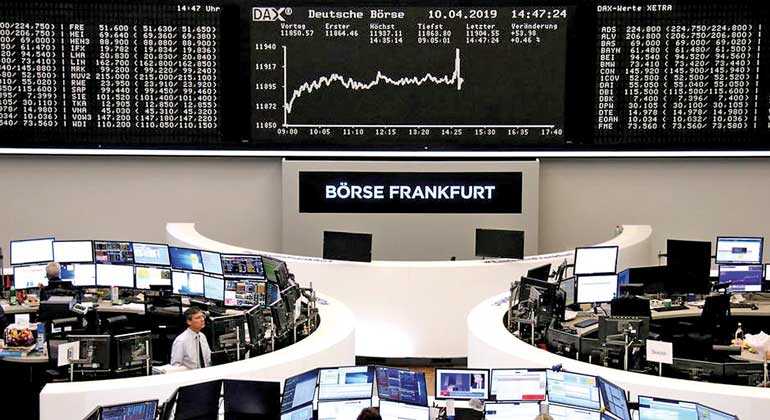Thursday Feb 19, 2026
Thursday Feb 19, 2026
Tuesday, 23 July 2019 00:00 - - {{hitsCtrl.values.hits}}

The German share price index DAX graph is pictured at the stock exchange in Frankfurt, Germany - Reuters
TOKYO (Reuters): Asia stocks fell on Monday as investors scaled back expectations of an aggressive interest rate cut by the Federal Reserve, while heightened Middle East tensions following Iran’s seizure of a British tanker lifted crude oil prices.
MSCI’s broadest index of Asia-Pacific shares outside Japan was down 0.4%.
Japan’s Nikkei fell 0.3% on the more tempered Fed easing views and caution ahead of the domestic earnings season which starts this week.
The Shanghai Composite Index was down 1.1%, but all eyes were on the debt of China’s new Nasdaq-style STAR tech board. It had a wild opening day as expected, with most firms surging and circuit breakers popping in early trade.
Hong Kong’s Hang Seng dropped 0.9%. South Korea’s KOSPI shed 0.1%.
Global equity markets had risen briefly towards the end of last week after dovish comments by New York Fed President John Williams boosted expectations the central bank would lower rates by 50 basis points (bps) at its July 30-31 meeting.
But stock markets gave back those gains on Friday, with Wall Street shares falling, after the New York Fed walked back Williams’ comments by saying his speech was not about potential policy action at the upcoming Fed meeting.
Expectations for a larger cut were scaled back even more after the Wall Street Journal reported the Fed was likely to cut rates by 25 bps this month, and may make further cuts in the future given global growth and trade uncertainties.
“The possibility of a 50 bps cut has almost dissipated following the WSJ report and the New York Fed’s attempt to tone down earlier comments by Williams,” wrote Kenji Yamamoto, economist at Daiwa Securities.
The dollar and US Treasury yields rose on the greater likelihood of a shallower rate cut.
The dollar index against a basket of six major currencies was steady at 97.179 after rising 0.4% on Friday.
The euro was little changed at $ 1.1215 after shedding 0.5% on Friday. The greenback edged up 0.2% to 107.970 yen thanks to a rise in US yields.
The benchmark 10-year Treasury yield stretched Friday’s modest gains and climbed to 2.056%.
Still, the broad decline in equity markets limited the rise in safe-haven Treasury yields.
“A factor which could guide stocks lower this week are tweets by US President Donald Trump pertaining to trade issues with China,” said Junichi Ishikawa, senior forex strategist at IG Securities.
“Stocks could decline if he continues to make challenging trade comments directed at China this week.”
Trump maintained pressure on Beijing last week by renewing a threat to impose tariffs on another $ 325 billion of Chinese goods, even as hopes grew that the two sides could soon resume face-to-face negotiations in a bid to end their year-long trade war.
Oil extends gains
In commodities, Brent crude futures were up 1.4% at $ 63.35 per barrel following a gain of about 0.9% on Friday.
Iran’s Revolutionary Guards on Friday captured a British-flagged oil tanker in the Gulf after Britain seized an Iranian vessel earlier this month, further raising tensions along a vital international oil shipping route.
US crude futures advanced 0.95% to $ 56.15.
Gold slipped from a six-year high as the dollar firmed and as expectations for a deep rate cut by the Fed were dialled back.
Spot gold traded at $ 1,427.94 an ounce after going as high as $ 1,452.60 on Friday, its strongest since May 2013.